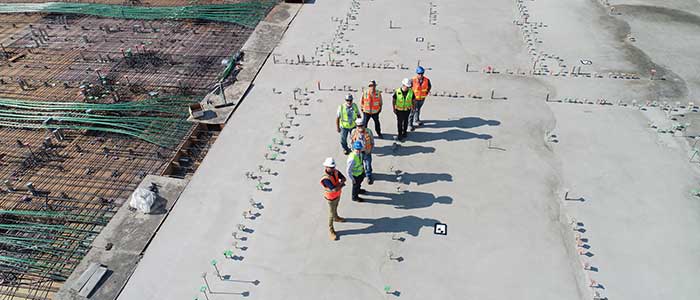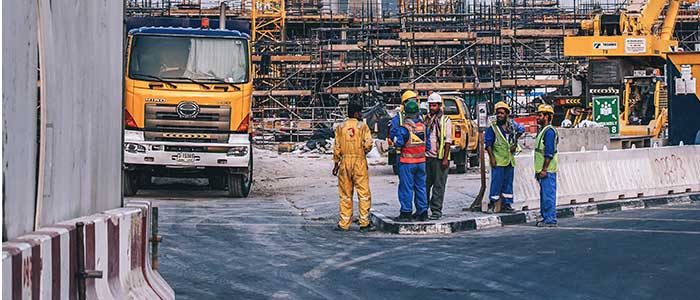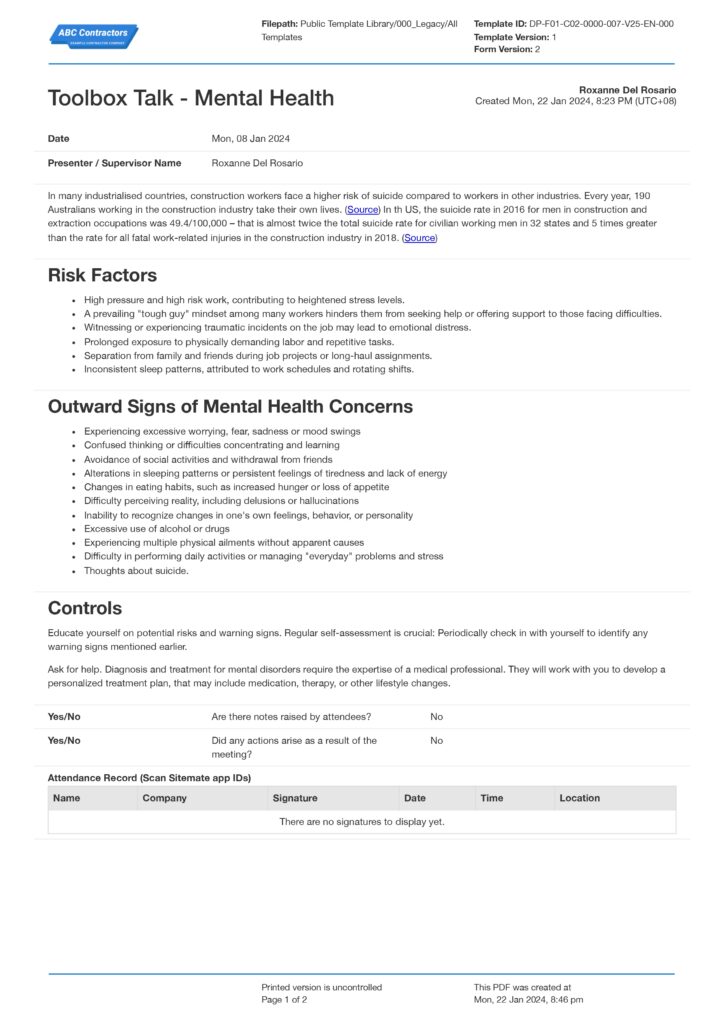Dashpivot Article – Mental Health Awareness in Construction

Mental Health Awareness in Construction
Why Does Mental Health Awareness Matter in the Construction Industry?
Mental health awareness in construction matters, as it has a significant impact and contribution to the overall well-being of construction workers and employees. It’s crucial to address and prioritise both physical and mental health in the workplace because they are linked to one another. Physical demands and hazards can cause extreme stress and anxiety among workers, while similarly, mental health challenges affect workers' ability to perform tasks safely.
Promoting mental health awareness and addressing mental health improve overall morale in the workplace. Employees are satisfied with their jobs, they are more productive, and they are in a safe and supportive work environment.
Incorporating and implementing health and safety, and mental health awareness programs ensures that employees are prepared for the physical demands and mental stress of their jobs in the dynamic industry. The construction industry is widely known for its demanding nature, heavy workload, and high-risk environment. Every day workers are subject to highly dangerous situations and hazards like falls, falling objects, electrical hazards, hazardous materials, motion injuries, accidents, confined spaces, extreme weather conditions, and noise that not only affect their physical well-being but also their mental health.
Furthermore, long working hours, tight deadlines, job insecurity, financial pressure, isolation, substance abuse, harassment, PTSD, and many more exacerbate workplace stress. Safety and mental health wellness practices, in the long run, can help the workforce lead a safer, healthier, and more productive service, and at the same time contribute to the sustainability of the business. Mental health awareness matters in the construction industry, as it is both a moral obligation and a smart business strategy.
How Does Mental Health Awareness in Construction Differ from Other Industries?
Mental health awareness is prioritised in all types of industries, but with the demanding nature, culture, work conditions, and complex tasks construction workers face every day, it is most especially critical in the construction industry. It’s a traditionally male-dominated field with a stigma around mental health which often prevents workers from seeking professional help. Additionally, projects are temporary, going in about a few years or so, leading to job instability. This uncertainty causes stress and anxiety. Many construction workers work multiple projects at different shifts, or may move in between projects and regions, causing the feeling of isolation and lack of support system. Workers may often work at odd hours or beyond shifts, which lead to sleep deprivation and burnout.
With the high-risk nature and prone to hazardous incidents in the construction site, this adds more stress to employees.
Despite safety being prioritised all throughout the site, life-threatening situations are still present and there is this pressure to ensure that workers avoid mistakes that could possibly lead to accidents and worst, death. The construction industry is mostly driven by deadlines, with the additional pressure and the need to do things quickly and efficiently, workers feel overwhelmed by the almost unrealistic expectations.
With all of these unique factors, the construction industry stands apart from others. It’s especially more important to prioritise mental health awareness and conduct targeted mental health initiatives in this industry.
This may put some pressure on employers and businessmen, but this will lead to a long-term commitment. Mental health awareness should be integrated into business strategies and be included in the company’s values.
How to Promote Mental Health Awareness in Construction
Firstly, it’s important to promote mental health awareness by encouraging conversations and normalising talking about mental health. Employers should foster an open and culture that talks about mental health issues by conducting regular meetings, toolbox talks, campaigns, trainings, and many more. They should lead by example, so that the rest of the employees will follow. They can promote awareness by using posters, banners, regular mental health check emails, encouraging support systems, providing training and education, offer access to mental health resources like employee assistance programs, implement mental health days, and more.
Secondly, it should be the employer’s initiative to provide education and training like Mental Health First Aid, Stress Management Workshops, Mental Health Seminars, and Suicide Awareness Training to educate employees on the warning signs and how to intervene.
Thirdly, employees should be given access to professional health and mental health resources. Employers should provide counselling and support for whenever employees need one. There should also be regular wellness checks where mental health professional visit the projects and sites for sessions and consultations.
Fourthly, the organisation should develop mental health supportive policies like implementing mental health days, providing flexible scheduling where possible, and being open to intolerance for bullying and harassment. There should be policies in place that allow workers to take days off, manage personal needs, and address workplace toxic behaviour that impact mental health.
Fifthly, oftentimes organisations partner with advocate and wellness groups in hosting awareness campaigns. There could be workshops, seminars, group discussions, fun runs, and many more.
Lastly, conduct surveys and feedback about mental health and ask employees if the organisation is doing enough to address mental health issues in the workplace. Employers should also track key metrics like absenteeism, productivity, health incidents, and many more.
How Can Mental Health Awareness in Construction be Surfaced Organically?
A Mental Health Awareness Toolbox Talk is like any other toolbox talk that is discussed on a construction site or workplace. It focuses on spreading awareness about mental health issues and having open conversations between employers and employees. It’s one of the ways that promotes a safe, supportive, and open culture.
A Mental Health Awareness Toolbox Talk is normally included in the regular briefings prior to starting work on site. It includes supervisors or professionals explaining the purpose of having the discussion. The discussion about the common challenges in the workplace may differ depending on the workplace dynamics. The most important parts of the discussion are talking about the stressors, addressing how they all affect the well-being of the employees, recognising early signs, and offering support to team members. The employer should ensure that they are able to provide the necessary resources that support the employees' mental health.
Conducting regular mental health awareness toolbox talks helps normalise mental health discussion in the workplace. It empowers employees to seek professional help and be a supportive system to fellow employees in the workplace. It’s a simple but impactful way to promote mental health awareness.

Use free and customisable forms to raise mental health awareness in construction
How Can Dashpivot Help Further Promote Mental Health Awareness in the Workplace?
Toolboxes are not the only document that promotes mental health awareness in the workplace. There are multiple construction forms that are heavily related to promoting mental health in the workplace, whether directly or indirectly.
You and your team can leverage the features available in Dashpivot to create pre-built forms to streamline the entire workflow and processes. Some example forms are Mental Health Incident Reports, Wellness Check-in Forms, Mental Health Risk Assessment Forms, Feedback Forms, Training Records, Self-Assessment Forms, Stress Audit Forms, and many more.

Safety Toolbox Talk template
This toolbox talk template is quick and easy to complete and signoff on site, and keeps all of your toolbox talks neatly organised and professional.

Safety Meeting Minutes template
Look more professional during meetings and keep your meeting minutes more organised using this safety meeting minutes template.

Construction Safety Plan template
This construction safety plan template improves your safety performance and compliance in less time.

